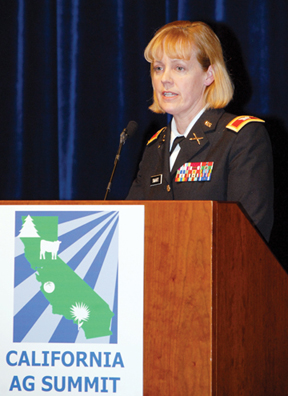Forget oil. For thousands of years, more wars have been fought over food and water than for any other reason. It's a history that forecasters at the United Nations and other organizations say will likely be repeated in years ahead.
"Food will win the war" was a popular patriotic slogan during both World War I and II. But in the 21st century, the U.S. military believes food can play a huge role in helping prevent wars from happening.
"The world has become more insecure since the end of the Cold War in the late 1980s," said U.S. Army colonel Cheryl Smart (pictured) at the second annual California Ag Summit last week in Davis, Calif. "A smaller, flatter, more troubled world is the forecast outlook. What we're seeing now is more conflict between nations of haves and have-nots."
![]()
Smart explained that the biggest instability problems today are in areas that do the poorest job of meeting their own foods needs and/or have shortages of other essential resources such as water. Because food is perhaps the most fundamental necessity of a strong and stable nation, such shortages invariably lead to social unrest, economic weakness, and political instability.

"As business and the economy go, so do defense and national security eventually," Smart added.
Helping other, less-developed nations achieve self-sufficiency in food production can be a powerful weapon in the fight against terrorism and regional conflicts, she added. But doing so requires increased research and development investment into new technologies and methods that "work out there, not just here."
"Food will win the war" was a popular patriotic slogan during both World War I and II. But in the 21st century, the U.S. military believes food can play a huge role in helping prevent wars from happening.
"The world has become more insecure since the end of the Cold War in the late 1980s," said U.S. Army colonel Cheryl Smart (pictured) at the second annual California Ag Summit last week in Davis, Calif. "A smaller, flatter, more troubled world is the forecast outlook. What we're seeing now is more conflict between nations of haves and have-nots."
Smart explained that the biggest instability problems today are in areas that do the poorest job of meeting their own foods needs and/or have shortages of other essential resources such as water. Because food is perhaps the most fundamental necessity of a strong and stable nation, such shortages invariably lead to social unrest, economic weakness, and political instability.

"As business and the economy go, so do defense and national security eventually," Smart added.
Helping other, less-developed nations achieve self-sufficiency in food production can be a powerful weapon in the fight against terrorism and regional conflicts, she added. But doing so requires increased research and development investment into new technologies and methods that "work out there, not just here."








